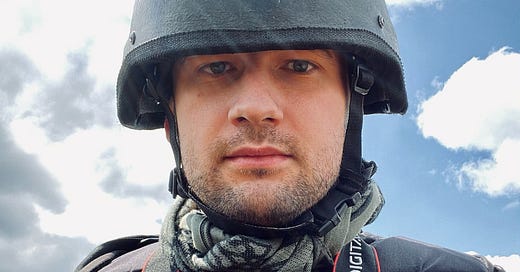Last summer, a year into Russia’s full-scale invasion of Ukraine, defence reporter Illia Ponomarenko left the Kyiv Independent – an English-language newspaper he helped found in November 2021 – to “reload … from deep and extreme exhaustion” and finish his book on the war.
“Initially I wanted this to be a standard military history book – lots of military analysis, maps, arrows, fancy military terms,” he told me in a New Books Network interview. “But I realised that there are lots of people who do this better than I would … I needed to talk about things that happened behind these headlines and about our own experience in this war: about human emotions, about what regular people do. And, during that battle, regular people, just like you and me, would do incredible things and make hard moral choices … I decided that I was better off telling the story of what it's like to be in a city that is doomed to fail and to fall, and to experience the escape from the inevitable apocalypse of the entire world around us. So this is what it is about. It's a very personal book”.
The result is I Will Show You How It Was: The Story of Wartime Kyiv - published next week (7 May) by Bloomsbury - and “very personal” it is. We live through Kyiv's extended, delusional pre-invasion Christmas, the shotgun founding of the Kyiv Independent, Illia's attempts to convince his mother to leave southern Donbas for Kyiv, the 400-kilometre drive to his girlfriend's parents on the Moldovan border, and the drive back to cover the battle for nation's capital. These desperate days saved Kyiv and Ukraine but they also turned Illia Ponomarenko into a worldwide media personality, as his live-tweeting expanded his Twitter following from 80,000 to 1.2 million. A 32-year-old native Russian speaker from Volnovakha - a railway hub 50 kilometres north of Mariupol - Illia’s back story, fluent English, and angry post-Euromaidan, Western-facing patriotism struck a chord.
“There is definitely this difference between generations: between younger generations like myself who grew up thinking in a Western way, who were absorbing Western values - so many things like rule of law, the value of democracy, of freedom, the sense of dignity as a citizen, the sense of the government being obliged to us and not vice versa. In many ways, it feels so natural to us right now and it feels very unnatural to our parents or our grandparents who grew up under a very different atmosphere and a very different perception of the government and the country”. Older people in the south and east who felt an affinity to Moscow can now see that “Russia has done terrible things to their own homes, to their own cities … It's not that they all became Ukrainian nationalists … [but] they realised very lately that the Russian regime is evil. It brings grief, it brings destruction. It's a devil that promises a lot and delivers nothing but blood, grief, death and destruction”.
At least some of the people still living in occupied eastern Donbas haven’t changed their minds. Is it worth fighting to the last Ukrainian to regain these economically ruined gangster statelets? "It's not a question of territories,” he says. “What many in the West think about as the possible settlement and the compromise in territorial concessions will inevitably be just a short pause for Russians to concentrate their resources, to consolidate, to fix a lot of flaws and mistakes about their strategy, about the functions of their military who greatly underperform in their current state in Ukraine and there will be just a war delayed by several months, maybe a year at best, and Russia will come back for more in a much better condition … If you ask me about the image of Ukrainian victory, I say that Ukraine staying and surviving as an independent nation with control of most of its territories … being a democracy, being stable, being a successful nation and doing everything possible and impossible to prevent another war in terms of getting the best military power it can get for the future and the best economy we can get for the future is the victory. Survival is victory for me but, unfortunately, we're not at the point when we can talk about such things. We are still at the state of being absolutely eliminated as a country as a nation”.
For my Writers’ Writers tip sheet, he chose Babi Yar: The Story of Ukraine’s Holocaust by Anatoly Kuznetsov as “A. Anatoli” (first published in Russian in 1966; English translation by David Floyd1 now in Vintage Classics, 2024) and Our Enemies Will Vanish: The Russian Invasion and Ukraine’s War of Independence by Yaroslav Trofimov (Penguin, 2024).
As a bizarre aside, Russian-speaker Floyd was a translator at the British military mission in Moscow at the end of the Second World War, before serving as a diplomat there and in Prague, and Belgrade. In 1950, the foreign office learned that Floyd had been secretary of the Oxford University branch of the Communist Party, married a comrade, and was arrested at an anti-war protest. A short inquiry was shelved until, in 1951, Floyd made a voluntary confession that he had spied for the Soviets in Moscow. To avoid embarrassment, MI5 and MI6 found him a job at the Daily Telegraph, where he worked for 30 years as a specialist on communism. This was all kept quiet until a 2018 exposé in the Sunday Times.





